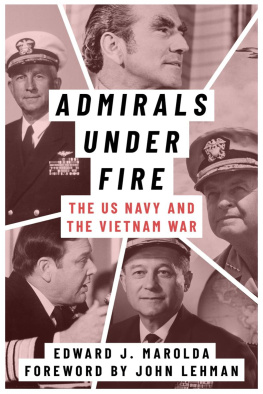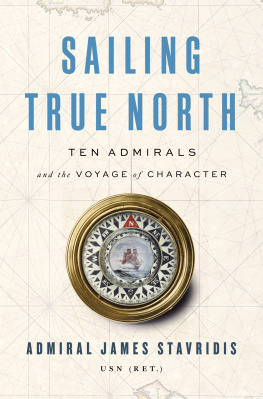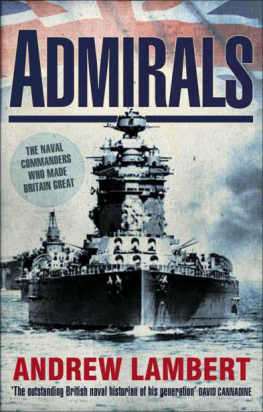Fox Gustavus Vasa - Lincoln and His Admirals
Here you can read online Fox Gustavus Vasa - Lincoln and His Admirals full text of the book (entire story) in english for free. Download pdf and epub, get meaning, cover and reviews about this ebook. City: New York, Oxford, United States, United States, year: 2008, publisher: Oxford University Press, genre: History. Description of the work, (preface) as well as reviews are available. Best literature library LitArk.com created for fans of good reading and offers a wide selection of genres:
Romance novel
Science fiction
Adventure
Detective
Science
History
Home and family
Prose
Art
Politics
Computer
Non-fiction
Religion
Business
Children
Humor
Choose a favorite category and find really read worthwhile books. Enjoy immersion in the world of imagination, feel the emotions of the characters or learn something new for yourself, make an fascinating discovery.
- Book:Lincoln and His Admirals
- Author:
- Publisher:Oxford University Press
- Genre:
- Year:2008
- City:New York, Oxford, United States, United States
- Rating:3 / 5
- Favourites:Add to favourites
- Your mark:
- 60
- 1
- 2
- 3
- 4
- 5
Lincoln and His Admirals: summary, description and annotation
We offer to read an annotation, description, summary or preface (depends on what the author of the book "Lincoln and His Admirals" wrote himself). If you haven't found the necessary information about the book — write in the comments, we will try to find it.
Lincoln and His Admirals — read online for free the complete book (whole text) full work
Below is the text of the book, divided by pages. System saving the place of the last page read, allows you to conveniently read the book "Lincoln and His Admirals" online for free, without having to search again every time where you left off. Put a bookmark, and you can go to the page where you finished reading at any time.
Font size:
Interval:
Bookmark:
LINCOLN
AND HIS
ADMIRALS
Also by Craig Symonds
Decision at Sea: Five Naval Battles That Shaped American History
American Heritage History of the Battle of Gettysburg
Confederate Admiral: The Life and Wars of Franklin Buchanan
Stonewall of the West: Patrick Cleburne and the Civil War
Joseph E. Johnston: A Civil War Biography
The Naval Institute Historical Atlas of the U.S. Navy
Navalists and Antinavalists: The Naval Policy Debate in the United States, 17751827
Gettysburg: A Battlefield Atlas
A Battlefield Atlas of the American Revolution
A Battlefield Atlas of the Civil War
Edited by Craig L. Symonds
The Civil War Reader, 1862
New Interpretations of Naval History
New Aspects of Naval History
The Civil War Recollections of General Ellise Spear (co-editor)
A Year on a Monitor and the Destruction of Fort Sumter
Recollections of a Naval Officer
Charleston Blockade: The Journals of John B. Marchand, U.S. Navy 18611862
AND HIS
ADMIRALS
ABRAHAM LINCOLN,
THE U.S. NAVY,
AND THE CIVIL WAR
CRAIG L. SYMONDS


Oxford University Press, Inc., publishes works that further
Oxford Universitys objective of excellence
in research, scholarship, and education.
Oxford New York
Auckland Cape Town Dar es Salaam Hong Kong Karachi
Kuala Lumpur Madrid Melbourne Mexico City Nairobi
New Delhi Shanghai Taipei Toronto
With offices in
Argentina Austria Brazil Chile Czech Republic France Greece
Guatemala Hungary Italy Japan Poland Portugal Singapore
South Korea Switzerland Thailand Turkey Ukraine Vietnam
Copyright 2008 by Craig L. Symonds
Published by Oxford University Press, Inc.
198 Madison Avenue, New York, NY 10016
www.oup.com
Oxford is a registered trademark of Oxford University Press
All rights reserved. No part of this publication may be reproduced,
stored in a retrieval system, or transmitted, in any form or by any means,
electronic, mechanical, photocopying, recording, or otherwise,
without the prior permission of Oxford University Press.
Library of Congress Cataloging-in-Publication Data
Symonds, Craig L.
Lincoln and his admirals / Craig L. Symonds.
p. cm.
Includes bibliographical references and index. ISBN 978-0-19-531022-1
1. Lincoln, Abraham, 18091865Military leadership.
2. United StatesHistoryCivil War, 18611865Naval operations.
3. PresidentsUnited StatesBiography.
4. United States. NavyHistory19th century.
5. Welles, Gideon, 18021878.
6. Fox, Gustavus Vasa, 18211883. I. Title.
E457.2.S94 2008 973.7092dc22 2008004251
1 3 5 7 9 8 6 4 2
Printed in the United States of America
on acid-free paper
1. What Have I Done Wrong?:
Lincoln and the Fort Sumter Crisis
2. A Competent Force:
Lincoln and the Blockade
3. No Affront to the British Flag:
Lincoln and the Trent Affair
4. Rain the Rebels Out:
Lincoln and the River War
5. It Strikes Me Theres Something in It:
Lincoln and the Monitor
6. We Cannot Escape History:
Lincoln and the Contrabands
7. The Peninsula All Over Again:
Lincoln, Charleston, and Vicksburg
8. I Shall Have to Cut This Knot:
Lincoln as Adjudicator 220
9. Peace Does Not Appear So Distant as It Did:
Lincoln and Wartime Politics
10. A Worthy Object:
Lincoln and the Red River Campaign
11. A Vote of Thanks:
Lincoln and the Politics of Promotion
12. I Must Refer You to General Grant:
Lincoln Relinquishes the Conn
Epilogue: Thank God That I Have Lived to See This:
Lincoln and the End of the War
AS ALWAYS, I am indebted to a number of friends, colleagues, and fellow scholars who aided me with this book. At Oxford University Press, Peter Ginna first signed me up for the project, and Timothy Bent encouraged it through to completion. Dayne Pohusta guided me through the design process, and Joellyn Ausanka through production. Sue Warga, the diligent copy editor, saved me from a number of embarrassing errors.
Many friends, colleagues, and fellow scholars read all or part of the manuscript, offered helpful suggestions, or assisted me in finding materials. These include William W. Freehling, Singletary Professor of History at the University of Kentucky; Jeff Flannery at the Library of Congress; Eric Foner, the DeWitt Clinton Professor of History at Columbia University; William Gladstone, an expert in African American Civil War soldiers; Charles E. Greene, Keeper of the Rare Book Reading Room in the Firestone Library at Princeton; John W. Hinds at the College of Marin; Harold Holzer at the Metropolitan Museum of Art, a noted Lincoln scholar with whom I shared numberless rich conversations and almost as many glasses of wine; Gary Joiner at LSU, Shreveport, who read ; Jim McPherson, the dean of Civil War scholars, who read the entire manuscript and offered many excellent suggestions; Edward Ted OReilly at the New-York Historical Society; John C. Rhodehammel at the Huntington Library; William Lee Miller at the University of Virginia; John Sellars at the Library of Congress; Richard W. Peuser at the National Archives; Florence Flo Todd of the Nimitz Library at the U.S. Naval Academy, who handled all my interlibrary loan requests; Budge and Russ Weidman, who offered their hospitality, support, and friendship; Frank Williams, Chief Justice of the Rhode Island Supreme Court and Lincoln expert; and John F. Witt, professor of law and history at Columbia University, who helped me with legal aspects of the blockade. I also want to thank Laura Waayers and Ed Finney at the Naval Historical Center, who helped with the illustrations.
Also, as ever, my greatest debt is to my wife, Marylou, best friend, travel companion, and peerless editor. This is her book, too.
THIS IS A BOOK ABOUT THE EMERGENCE AND GROWTH of Abraham Lincoln as a wartime commander in chief. To illustrate that evolution, it focuses on Lincolns relationship with, and management of, the United States Navy. In the middle of the last century, the historian T. Harry Williams published a book entitled Lincoln and His Generals. In it, he posited that Lincoln was a great natural strategist, a better one than any of his generals. Most of those generals do not fare well at Williams hand. Though he had some good things to say about Grant and Sherman, his scorn for the likes of Ambrose Burnside, Joseph Hooker, William S. Rosecrans, and Don Carlos Buell is palpable, and he reserved his most vitriolic condemnations for the erstwhile young Napoleon, George B. McClellan. In part, no doubt, this was because McClellan was (and is) an easy target, but in addition Williams was offended by McClellans dismissive treatment of the president, including Little Macs private references to Lincoln as the original gorilla. Williams began his work by declaring that I have written in this book the story of Abraham Lincoln the commander in chief. But that is only partly true, for he did not include any discussion of Lincolns relationship with the navy. Indeed, there is only one entry for the navy in his index, and it is Navy, United States, and McClellan, for which there is but a single page reference. Other scholars since then have tried
When he took office in March 1861, navies and naval matters were utterly foreign to Lincoln. Yet as president he would preside over the development and deployment of the largest naval force in American history to date, a force that would not be eclipsed in size or number until the emergence of the gray steel armadas of the world wars. From virtually the first day of his presidency when he had to consider dispatching a naval expedition to rescue the garrison of Fort Sumter, Lincoln was compelled to become a student of naval warfare. At least some of his education took place at the Washington Navy Yard. Barely a week after the fall of Sumter, Abraham and Mary Lincoln visited the Navy Yard to view the body of Lincolns young friend Elmer Ellsworth, shot dead after hauling down a Confederate flag from the roof of a hotel in Alexandria. Two weeks later, Lincoln was at the Navy Yard again, this time to enjoy a concert of martial tunes by the band of the 71st Pennsylvania regiment. From that day until virtually his last day as presidentwhich was also his last day on earththe Navy Yard was one of the places, along with the War Department telegraph office, that he visited regularly. He became a close friend of the yards commandant, Commander (later Rear Admiral) John A. Dahlgren, and he often arrived there unannounced, sometimes with a friend or cabinet member, sometimes with his wife, sometimes alone, to witness the test firing of one or another new weapon or simply to get away from the White House for a few hours.
Next pageFont size:
Interval:
Bookmark:
Similar books «Lincoln and His Admirals»
Look at similar books to Lincoln and His Admirals. We have selected literature similar in name and meaning in the hope of providing readers with more options to find new, interesting, not yet read works.
Discussion, reviews of the book Lincoln and His Admirals and just readers' own opinions. Leave your comments, write what you think about the work, its meaning or the main characters. Specify what exactly you liked and what you didn't like, and why you think so.










